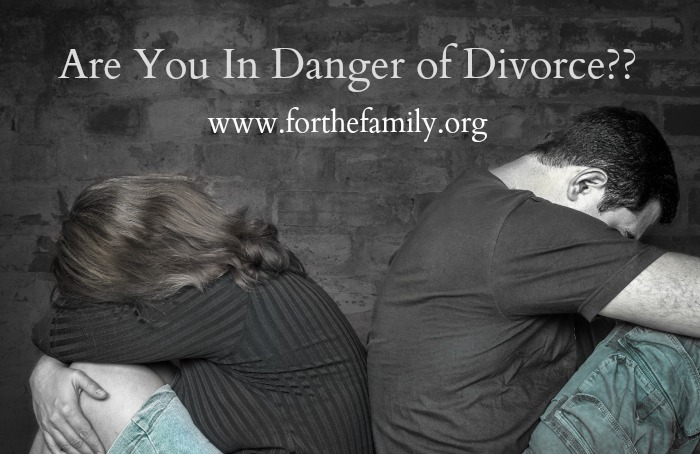Are You In Danger of Divorce?
While “love” is something many people think they fall into, studies show that divorce is something we usually grow into.
William Doherty, professor of family social science at the University of Minnesota, provides an insightful distinction between what he calls “hard reasons” and “soft reasons” that split couples up and lead to divorce.
In Doherty’s view, “hard reasons” include “chronic affairs, chemical dependency, and gambling” in which “the person is not willing to change. They have a drinking problem and won’t get it fixed. They’re gambling the family money away and won’t get help.”
“Soft reasons” for divorce include “general unhappiness and dissatisfaction, such as growing apart and not communicating.”
Doherty found that most marriages aren’t destroyed by “hard reasons” but rather by “soft” ones. In Doherty’s study, the number one reason couples gave for getting a divorce was “growing apart,” followed by “unable to talk together,” “how spouse handles money, “spouse’s personal problems,” and “not getting enough attention.”
I’m not sure how Doherty defines “spouse’s personal problems,” but at first glance, none of the top five reasons given are biblical excuses for ending a marriage. It’s not until number six that “infidelity” is mentioned.
What this study highlights is that even when marital satisfaction reaches a crisis point, the problem isn’t the person we married, but our lack of skills in the art of marriage. We don’t know how to reconnect, we fail to listen to each other, we grow callous instead of empathetic. All of these things can be developed; we can change them, and in doing so, change the marriage, without changing partners.
Quite frankly, on a relational and spiritual level, most of us are seriously under-qualified to enter marriage. (I put myself at the top of the list here.) Even before the wedding pictures come back from the photographer, we may realize that we’re in “over our heads” and feel like we’re drowning. Marriage all but demands that we grow, and a lot of us either resent the implication that we need to grow or are too lazy to work toward personal growth.
When “soft issues” are the problem, divorce is a very ineffective shortcut. Divorce won’t increase our relational skills, and it won’t solve what led to the destruction of our first marriage. It’ll just put off the day of reckoning that we need to grow in certain areas.
Instead of finding a new spouse, we need to learn new ways to express empathy. Instead of getting a divorce, we need to get rid of laziness. Instead of cataloguing our spouse’s shortcomings, we need to learn the spiritual art of forgiveness. Instead of searching for a new partner, we need to search for ways we can stay connected.
If you don’t address the lack of relational skills that caused the first marriage to fail, the second one will, too—because, again, the problem isn’t who you chose to marry; the problem is the lack of your relational skills (“soft” skills instead of “hard”). The USA Today article also quotes Susan Heitler, a clinical psychologist who notes that marriage is a “very high-skilled activity. If your marriage is failing, make the assumption your skill set is insufficient.”
Unfortunately, our assumption is all too often that our spouse is insufficient; therefore, the only logical solution is to get a new spouse. If we assume that our skill set is insufficient, that there are things we need to learn about not becoming lazy in our relationship, practicing empathy, growing in humility, generosity, forgiveness and gratefulness, then we’ll see marital dissatisfaction as a call to grow deeper in holiness rather than a call to dissolve our family.
The clear teaching of this study is that persistent character weaknesses—laziness, arrogance, pride, selfishness, bitterness, a sense of entitlement, and so on—kill far more marriages than active affairs, chemical dependency, physical abuse or abandonment. The answer isn’t pursuing “happiness;” it’s pursuing holiness. By God’s grace, we can grow in each of these areas.
Dr. Heitler suggests that if both parties “will each take personal responsibility and focus on their own skills upgrade, the whole picture turns around. Even one person can turn the marriage around.”
Doesn’t this make sense?
What if we assumed marital dissatisfaction is usually an issue of character, not mismatching, and thus began working on ourselves instead of getting rid of our spouse and trying to find a new one?
What if, indeed, we found marriage as a call to holiness more than happiness, and then discovered that in the pursuit of holiness we actually achieved a level of happiness we never thought possible?
Hmmm. Somebody ought to write a book about this…
Blessings,








Very good post! We will be linking to this particularly great post on our website.
Keep up the great writing.
I am interested in knowing how one person can turn the marriage around. I am in a separation where my husband simply stated that he does not want to be married right now. I feel like I have no choice but to file for divorce because he will not do it.
This is an impossible question to answer absent dialogue. It depends on whether he’s a believer, whether he would listen to your church staff, do you have kids–there are dozens of questions that could affect the answer.
I hope you’ll seek a counselor who could have that dialogue with you. You might also find some helpful general principles in Lisa Vernick’s book, “How to Act Right When Your Spouse Acts Wrong.”